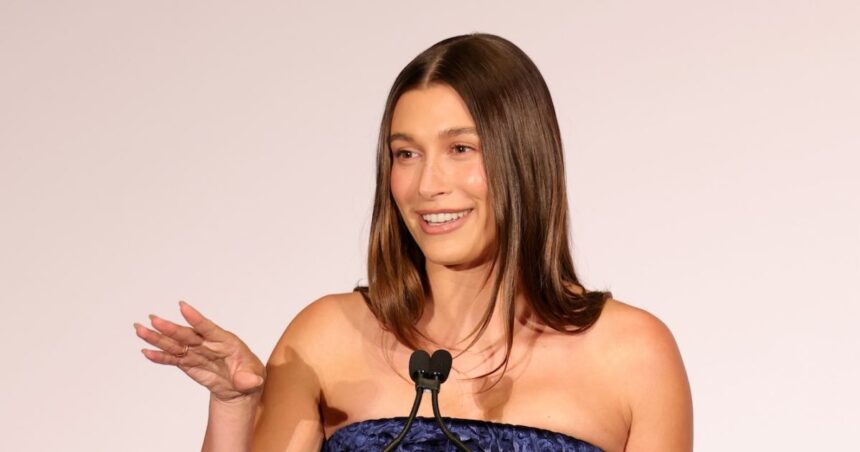Hailey Bieber was honored with the Beauty Innovator of the Year award at The Daily Front Row’s 9th Annual Fashion Los Angeles Awards, supported by Casamigos. During her acceptance speech, the 28-year-old founder of Rhode Skin took a moment to express her gratitude to her husband, Justin Bieber, for his unwavering support in building her beauty empire.
Presented by celebrity hairstylist Jen Atkin, Hailey was praised for her evolution over the years. Atkin commended Hailey for her success on red carpets, major campaigns, and especially on her wedding day, where she was the epitome of calm amidst the chaos. She described Hailey as a “moisturized calm in the storm” and celebrated her as a boss, style icon, and skincare guru.
Hailey, who welcomed son Jack Blues last August, thanked everyone who has contributed to Rhode’s success in her speech. She acknowledged her customers, friends, and Jen for their support and mentorship. She also expressed her appreciation for her husband, Justin, for believing in her dream from the start and always cheering her on.
In a heartfelt moment, Hailey concluded her speech by thanking Justin for his unwavering support. As she accepted her award at the Beverly Hilton Hotel, she reflected on the community they have built at Rhode and how grateful she is for the love and encouragement she has received.
Earlier that day, Justin took to Instagram to address rumors surrounding his marriage to Hailey. He shared a message acknowledging the jealousy and scrutiny they face as a couple but emphasized the strength of their relationship. Justin also reflected on his own flaws and the importance of forgiveness, both from others and from himself.
Overall, Hailey’s recognition as the Beauty Innovator of the Year was a testament to her hard work and dedication to her craft. With Justin by her side, she continues to shine in both her career and personal life, setting an example for others to follow. The world is constantly changing, and with it, so are our habits and lifestyles. One major shift that has occurred in recent years is the move towards a more sustainable way of living. This shift has been driven by a growing awareness of the impact that our actions have on the environment, as well as a desire to preserve the planet for future generations.
One of the key areas where sustainability has become increasingly important is in the way we consume and use energy. Traditional sources of energy, such as fossil fuels, are not only finite but also contribute to climate change and pollution. As a result, there has been a push towards renewable energy sources, such as solar, wind, and hydro power.
Solar energy, in particular, has seen a surge in popularity in recent years. This is largely due to advances in technology that have made solar panels more efficient and affordable. Solar energy is not only clean and renewable but also abundant – the sun provides more energy in one hour than the entire world uses in a year.
One of the major benefits of solar energy is that it can be generated on a small scale, making it accessible to individuals and households. This means that homeowners can install solar panels on their roofs and generate their own electricity, reducing their reliance on the grid and lowering their energy bills. In addition to saving money, using solar energy also reduces carbon emissions and helps to combat climate change.
But it’s not just homeowners who are embracing solar energy – businesses and governments are also making the switch. Companies are installing solar panels on their buildings to reduce their carbon footprint and demonstrate their commitment to sustainability. Governments are also incentivizing the use of solar energy through tax breaks and subsidies, as well as setting targets for increasing the use of renewable energy.
The shift towards solar energy is part of a larger movement towards a more sustainable way of living. By reducing our reliance on fossil fuels and embracing renewable energy sources, we can help to protect the planet for future generations. It’s clear that solar energy is not just a passing trend – it’s a vital part of the transition towards a cleaner, greener future.







